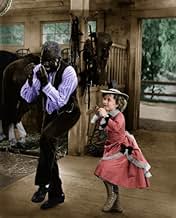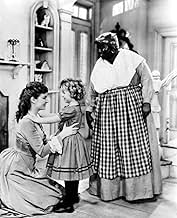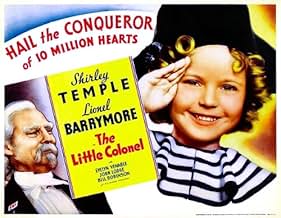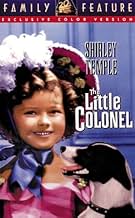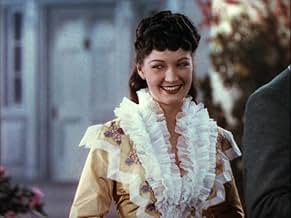In the post-Civil war south, a darling little girl attempts to restore the peace between her parents and her plantation owner grandfather.In the post-Civil war south, a darling little girl attempts to restore the peace between her parents and her plantation owner grandfather.In the post-Civil war south, a darling little girl attempts to restore the peace between her parents and her plantation owner grandfather.
- Awards
- 2 wins & 1 nomination total
Stephen Chase
- Hull
- (as Alden Chase)
C.E. Anderson
- Overseer
- (uncredited)
Martin Faust
- Frontiersman
- (uncredited)
Rolland Hamblen
- Trooper Doing Egg Trick
- (uncredited)
Frank Hammond
- Carriage Driver
- (uncredited)
Featured reviews
It's odd that Shirley Temple made two similar movies in the same year, both involving Civil War-type story lines and her character being very similar. "The Littlest Rebel" took place during the Civil War and "The Little Colonel" took place right after the war.
For some reason, I get an extra feeling being choked up seeing Shirley melting a crabby old man's heart as she did in some of her films, this being one of them. Here, it's Lionel Barrymore who was fun to watch in any film.
The lead female role was played by Evelyn Venable and she really wasn't up to the standards, beauty-wise, set by previous Temple adult feminine leads such s Gloria Stuart, Karen Moreley, Rochelle Hudson, etc. But, that's not important.
The story was more important and in case - surprise - I found this to run a distant second to the aforementioned "The Littlest Rebel." This movie was, frankly, boring in comparison.
I am not one of the crying Liberals who boycott Temple''s films because blacks in these movies were denigrated. Unfortunately, that's what you saw in 1930s films....and what's done is done. However, the black characters in here are just plain treated embarrassingly bad. Everyone's Mr. Nice Guy (mine, too) Bill Robinson, didn't come on the scene and dance with Shirley until later in the film when I had lost interest.
Temple, meanwhile, is so cute that she's even likable when she's a brat, as she acts several times with the old man (but apologizes later for her behavior).
It's still a good film but I prefer the "Rebel" over the "Colonel" in the battle of these 1935 Civil War-themed stories.
For some reason, I get an extra feeling being choked up seeing Shirley melting a crabby old man's heart as she did in some of her films, this being one of them. Here, it's Lionel Barrymore who was fun to watch in any film.
The lead female role was played by Evelyn Venable and she really wasn't up to the standards, beauty-wise, set by previous Temple adult feminine leads such s Gloria Stuart, Karen Moreley, Rochelle Hudson, etc. But, that's not important.
The story was more important and in case - surprise - I found this to run a distant second to the aforementioned "The Littlest Rebel." This movie was, frankly, boring in comparison.
I am not one of the crying Liberals who boycott Temple''s films because blacks in these movies were denigrated. Unfortunately, that's what you saw in 1930s films....and what's done is done. However, the black characters in here are just plain treated embarrassingly bad. Everyone's Mr. Nice Guy (mine, too) Bill Robinson, didn't come on the scene and dance with Shirley until later in the film when I had lost interest.
Temple, meanwhile, is so cute that she's even likable when she's a brat, as she acts several times with the old man (but apologizes later for her behavior).
It's still a good film but I prefer the "Rebel" over the "Colonel" in the battle of these 1935 Civil War-themed stories.
Having earned her nickname due to her stubborn temper, THE LITTLE COLONEL courageously tries to reunite her splintered family.
Shirley Temple smiles, pouts, tosses her curly locks and completely runs away with the movie. One of her early family classics, this is an excellent showcase for her tremendous charm & abundant talents. As box-office queen, the mighty moppet would dominate Hollywood during the second half of the 1930's. Never was a despot so welcomed or a tyrant so loved.
As one of the industry's finest character actors, crusty Lionel Barrymore gives the little lady a run for her money. Always entertaining, he knows when to purr or when to roar to maximum effect, even if he doesn't quite eclipse Little Miss Personality.
Hattie McDaniel adds her own unique gifts to the role of Shirley's faithful servant, never allowing her dignity to be demeaned. As always, she is a joy. The legendary Bill Robinson is also on hand, mostly, one suspects, so as to partner Shirley in a couple of dances and they are wonderful, especially in Robinson's signature Staircase Dance. They are perfectly matched - one ramrod straight & ebony, the other tiny & blonde - and their minutes together on the screen is the stuff of which movie magic is made.
Evelyn Venable & John Lodge, as Shirley's parents (it's rare for her to have both all the way through a film) do nicely with the romantic angle, but it's kept to a minimum, as is usual in a Temple film, where the spotlight is kept firmly focused on her. Sidney Blackmer appears as a smooth swindler who makes the serious mistake of angering THE LITTLE COLONEL.
Although the film is given good production values by 20th Century Fox, it is the interaction between little Shirley and the other performers which far and away is the most important aspect of the picture.
It should be noted that there are elements of racism in the story line, a not uncommon occurrence in Hollywood films of the 1930's.
The final scene segues into early Technicolor - a pleasant way to end the story.
Shirley Temple smiles, pouts, tosses her curly locks and completely runs away with the movie. One of her early family classics, this is an excellent showcase for her tremendous charm & abundant talents. As box-office queen, the mighty moppet would dominate Hollywood during the second half of the 1930's. Never was a despot so welcomed or a tyrant so loved.
As one of the industry's finest character actors, crusty Lionel Barrymore gives the little lady a run for her money. Always entertaining, he knows when to purr or when to roar to maximum effect, even if he doesn't quite eclipse Little Miss Personality.
Hattie McDaniel adds her own unique gifts to the role of Shirley's faithful servant, never allowing her dignity to be demeaned. As always, she is a joy. The legendary Bill Robinson is also on hand, mostly, one suspects, so as to partner Shirley in a couple of dances and they are wonderful, especially in Robinson's signature Staircase Dance. They are perfectly matched - one ramrod straight & ebony, the other tiny & blonde - and their minutes together on the screen is the stuff of which movie magic is made.
Evelyn Venable & John Lodge, as Shirley's parents (it's rare for her to have both all the way through a film) do nicely with the romantic angle, but it's kept to a minimum, as is usual in a Temple film, where the spotlight is kept firmly focused on her. Sidney Blackmer appears as a smooth swindler who makes the serious mistake of angering THE LITTLE COLONEL.
Although the film is given good production values by 20th Century Fox, it is the interaction between little Shirley and the other performers which far and away is the most important aspect of the picture.
It should be noted that there are elements of racism in the story line, a not uncommon occurrence in Hollywood films of the 1930's.
The final scene segues into early Technicolor - a pleasant way to end the story.
There will never be a child star to match Shirley Temple. A born actress, dancer, and entertainer. In this movie she has an amazing support cast of Lionel Barrymore who plays the part of a crusty grandfather but Shirley with her cute and charming ways soon melts the heart of the old grandfather.
Hattie Mac Daniel plays the faithful servant and once again it made you realize just how much these beloved negroes sometimes knew more than " The white folks". The dancing down the steps with "Bojangles Bill Robinson" is something that can make you appreciate the talent of a young and not so young. The story line can be weak in places and the acting might be a bit corny to todays standards but if you need a feel good movie then drag out a Shirley Temple movie . You won't be disappointed.
Hattie Mac Daniel plays the faithful servant and once again it made you realize just how much these beloved negroes sometimes knew more than " The white folks". The dancing down the steps with "Bojangles Bill Robinson" is something that can make you appreciate the talent of a young and not so young. The story line can be weak in places and the acting might be a bit corny to todays standards but if you need a feel good movie then drag out a Shirley Temple movie . You won't be disappointed.
The opening scene of "The Little Colonel" is set somewhere in the Deep South in the 1870s. The Civil War had been over for years, but plantation owner, Colonel Lloyd, still carried a hatred for the Yankees. When his daughter, Elizabeth, plans to marry a man from the North, Jack Sherman, Lloyd disowns her. Segue to six years later, at an Army cavalry post somewhere in the Northwest, and a special formation has been called by Colonel Gray for the commissioning of a new officer. Six-year-old Lloyd Sherman is commissioned a colonel in the U. S. Army. She is the daughter of Jack and Elizabeth Sherman, and has endeared herself to the whole post.
So sets the stage for this movie that stars six-year-old Shirley Temple as Lloyd Sherman - that is, Colonel Lloyd Sherman. Lionel Barrymore plays her grandfather, Col. Lloyd, Evelyn Venable plays Elizabeth and John Lodge plays Jack Sherman. But the best of the supporting cast in this film - after Barrymore, are the black servants who have stayed on the Lloyd's plantation after the Civil War abolished slavery. Bill Robinson plays the colonel's butler, Walker, and Hattie McDaniel plays the cook, Mom Beck. They share of the singing and dancing with young Shirley that add the musical aspects to the comedy drama and family film.
Robinson's staircase dance routine is memorable, and one has to note that he was "no spring chicken" when this movie was made. Robinson was the same age as Barrymore, 57, with both actors having been borne in 1878. Barrymore had to don the white hair and beard to look older, and Robinson may have had some sprinkling of powder for the light touch of white in his hair. Robinson went by the nickname, Bojangles, and was one of the best tap dancers in the world. He started young and performed in vaudeville, on stage and in the movies. And, Hattie McDaniel would become the first African-American to win an Academy Award, in 1940. She won the best supporting actress for her role as Mammy, in the great 1939 production of "Gone With the Wind."
The plot for this film is a good story in which the young Colonel Lloyd Sherman resolves all the problems and disagreements and it ends happily for everyone - well, except for a couple of bad guys who, we assume get what's coming to 'em.
I enjoyed watching this film again - these many, many years after seeing it on late night TV in the 1950s-60s. And, this time in color. Here are a couple of favorite lines from the film.
Dr. Scott, "Marriage is a wonderful institution." Colonel Lloyd, "Yes, us, no family should be without it."
May Lily, "You can't be no colonel." Lloyd Sherman, "Why not?" May Lily, "Because you ain't got no whiskers." Lloyd Sherman, "I don't need to have whiskers. I've got a temper. That's all you need to be a colonel."
So sets the stage for this movie that stars six-year-old Shirley Temple as Lloyd Sherman - that is, Colonel Lloyd Sherman. Lionel Barrymore plays her grandfather, Col. Lloyd, Evelyn Venable plays Elizabeth and John Lodge plays Jack Sherman. But the best of the supporting cast in this film - after Barrymore, are the black servants who have stayed on the Lloyd's plantation after the Civil War abolished slavery. Bill Robinson plays the colonel's butler, Walker, and Hattie McDaniel plays the cook, Mom Beck. They share of the singing and dancing with young Shirley that add the musical aspects to the comedy drama and family film.
Robinson's staircase dance routine is memorable, and one has to note that he was "no spring chicken" when this movie was made. Robinson was the same age as Barrymore, 57, with both actors having been borne in 1878. Barrymore had to don the white hair and beard to look older, and Robinson may have had some sprinkling of powder for the light touch of white in his hair. Robinson went by the nickname, Bojangles, and was one of the best tap dancers in the world. He started young and performed in vaudeville, on stage and in the movies. And, Hattie McDaniel would become the first African-American to win an Academy Award, in 1940. She won the best supporting actress for her role as Mammy, in the great 1939 production of "Gone With the Wind."
The plot for this film is a good story in which the young Colonel Lloyd Sherman resolves all the problems and disagreements and it ends happily for everyone - well, except for a couple of bad guys who, we assume get what's coming to 'em.
I enjoyed watching this film again - these many, many years after seeing it on late night TV in the 1950s-60s. And, this time in color. Here are a couple of favorite lines from the film.
Dr. Scott, "Marriage is a wonderful institution." Colonel Lloyd, "Yes, us, no family should be without it."
May Lily, "You can't be no colonel." Lloyd Sherman, "Why not?" May Lily, "Because you ain't got no whiskers." Lloyd Sherman, "I don't need to have whiskers. I've got a temper. That's all you need to be a colonel."
America's favorite moppet Shirley Temple may have met her match in scene stealing with Lionel Barrymore playing her grandfather. Just watching Barrymore taking back his scenes from Temple makes The Little Colonel an enjoyable film to watch.
Barrymore complete with white suit, Panatella, and goatee with long white hair looks like the spitting image of Colonel Sanders. He's one reconstructed old rebel and what Lee and Grant signed at Appomattox has no bearing on him. All he has to hear is that his daughter Evelyn Venable has taken unto herself a Yankee for a husband and he disowns her. So she and John Davis Lodge go first north and west and have themselves a daughter.
When Lodge goes into the west with a couple of shifty partners in a prospecting deal, he sends Venable and the little girl they have now back south to live with grandfather. Well kind of, as they take a gate cottage to live in.
But as these Shirley Temple movies go, you know it's Shirley who brings all the warring parties together. Who could resist.
The Little Colonel is known for that famous dance that Bill Robinson does with Shirley Temple on the staircase. It's still as entertaining as it ever was. The last couple of minutes are in color in which all the principal players appeared in that for the first time.
The scenes with Barrymore and Temple are absolutely precious. Just who was the best capturer of the audience's attention. Judge for yourself.
Barrymore complete with white suit, Panatella, and goatee with long white hair looks like the spitting image of Colonel Sanders. He's one reconstructed old rebel and what Lee and Grant signed at Appomattox has no bearing on him. All he has to hear is that his daughter Evelyn Venable has taken unto herself a Yankee for a husband and he disowns her. So she and John Davis Lodge go first north and west and have themselves a daughter.
When Lodge goes into the west with a couple of shifty partners in a prospecting deal, he sends Venable and the little girl they have now back south to live with grandfather. Well kind of, as they take a gate cottage to live in.
But as these Shirley Temple movies go, you know it's Shirley who brings all the warring parties together. Who could resist.
The Little Colonel is known for that famous dance that Bill Robinson does with Shirley Temple on the staircase. It's still as entertaining as it ever was. The last couple of minutes are in color in which all the principal players appeared in that for the first time.
The scenes with Barrymore and Temple are absolutely precious. Just who was the best capturer of the audience's attention. Judge for yourself.
Did you know
- TriviaShirley Temple memorized every line of dialogue in this movie, and while filming a scene with Lionel Barrymore, the veteran actor forgot a line. When Temple prompted him, Barrymore flew into a such a rage that one crew member took Temple away for fear that Barrymore might harm her. He later apologized to her, and they remained friends for many years.
- GoofsMom Beck telling Lloyd that her mother also had golden curls and pink cheeks as a child when her mother is brunette is not necessarily an error. Many blonde children's hair darkens as they age. Shirley Temple's hair darkened as she grew older and was also dark brunette as an adult.
- Quotes
Col. Lloyd: For your years and weight, you're probably the stubbornest person in this county.
Miss Lloyd Sherman: You weigh a lot more than I do!
- Alternate versionsAlso available in a computer colorized version.
- ConnectionsFeatured in Concept (1964)
- SoundtracksLove's Young Dream
(uncredited)
Lyrics by Thomas Moore
Played on harp and sung by Evelyn Venable (dubbed)
Later Sung by Shirley Temple
- How long is The Little Colonel?Powered by Alexa
Details
- Release date
- Country of origin
- Language
- Also known as
- La pequeña rebelde
- Production company
- See more company credits at IMDbPro
- Runtime
- 1h 21m(81 min)
- Color
- Aspect ratio
- 1.37 : 1
Contribute to this page
Suggest an edit or add missing content



